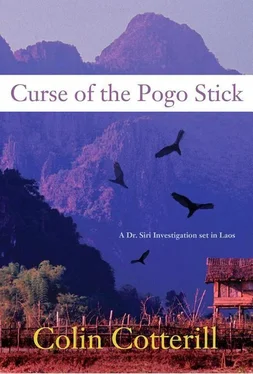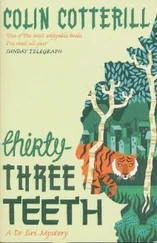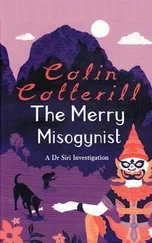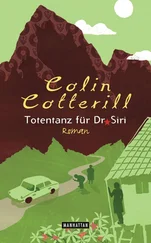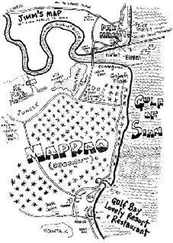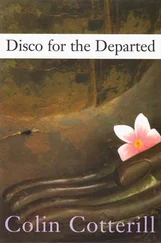Colin Cotterill - Curse of the Pogo Stick
Здесь есть возможность читать онлайн «Colin Cotterill - Curse of the Pogo Stick» весь текст электронной книги совершенно бесплатно (целиком полную версию без сокращений). В некоторых случаях можно слушать аудио, скачать через торрент в формате fb2 и присутствует краткое содержание. Жанр: Криминальный детектив, на английском языке. Описание произведения, (предисловие) а так же отзывы посетителей доступны на портале библиотеки ЛибКат.
- Название:Curse of the Pogo Stick
- Автор:
- Жанр:
- Год:неизвестен
- ISBN:нет данных
- Рейтинг книги:5 / 5. Голосов: 1
-
Избранное:Добавить в избранное
- Отзывы:
-
Ваша оценка:
- 100
- 1
- 2
- 3
- 4
- 5
Curse of the Pogo Stick: краткое содержание, описание и аннотация
Предлагаем к чтению аннотацию, описание, краткое содержание или предисловие (зависит от того, что написал сам автор книги «Curse of the Pogo Stick»). Если вы не нашли необходимую информацию о книге — напишите в комментариях, мы постараемся отыскать её.
Curse of the Pogo Stick — читать онлайн бесплатно полную книгу (весь текст) целиком
Ниже представлен текст книги, разбитый по страницам. Система сохранения места последней прочитанной страницы, позволяет с удобством читать онлайн бесплатно книгу «Curse of the Pogo Stick», без необходимости каждый раз заново искать на чём Вы остановились. Поставьте закладку, и сможете в любой момент перейти на страницу, на которой закончили чтение.
Интервал:
Закладка:
Colin Cotterill
Curse of the Pogo Stick
Prologue
As there were no longer any records, the Hmong could not even tell when they actually misplaced their history. The event had deleted itself. But the oral legend that was passed on unreliably like a whisper from China would have them believe the following:
The elders of the Hmong tribes had gathered to lead the great exodus. For countless centuries, their people had been victimized by the mandarins. With no more will to fight, the time had come to flee. Traditional nomads, the Hmong had few valuable possessions to carry. They would lead their animals and build new homes when they reached the promised lands to the south. But there was one artifact that belonged to all the Hmong. It was the sacred scroll that contained their written language, legends, and myths of ancestors in a sunless, ice-covered land, and, most importantly, the map of how to reach their nirvana: the Land of the Dead in the Otherworld.
With great ceremony, the scroll was removed from its hiding place, wrapped in goat hide, and given the position of honor at the head of the caravan. The Hmong walked for a hundred days and a hundred nights and on the hundred and first night they were lashed by a monsoon that drenched them all before they could find shelter. Cold and wet, they sat shivering in a cave until the sun rose. The keeper of the scroll was distraught to discover that the rain had soaked through the goat hide and dampened the sacred document. Chanting the appropriate mantras, they unrolled the text and laid it on the grass to dry beneath the hot morning sun. And the followers, exhausted from their sleepless night, found shade under the trees and fell into a deep sleep.
While they slumbered, a herd of cattle found its way up to the mountain pass and discovered both the sleeping Hmong and the hemp scroll inscribed with vegetable dyes. And, starved of new culinary experiences, they set about eating this delicious breakfast with vigor. The Hmong awoke to find their sacred scroll chewed to pieces. They chased off the cattle and collected the surviving segments. These they entrusted to a shaman who stayed awake with them and kept them safe and dry for the next hundred days and hundred nights. But on the hundred and first day, the clouds finally parted and the sun shone and the Hmong found themselves in a deserted village. Not one to ignore the lessons of experience, the shaman laid out the segments in the loft of the longhouse. Certain the remnants of the scroll wouldn’t be attacked by cattle or goats or birds there, he finally joined his brothers and sisters in a well-earned sleep. But he hadn’t taken the rats into account. Half-starved and desperate, the rats set about the hemp and devoured it in a frenzy. Unsated, but with the memory of food now implanted in their minds, they then turned upon one another. When the Hmong finally climbed into the loft, all they found were several ratty corpses and a few unreadable shreds of their culture. This, according to the legend, was how the Hmong lost their history and their written language.
The spirit of the first-ever Hmong shaman, See Yee, looked up from the Otherworld and was mightily pissed that his people could be so careless. He stewed over this for a lifetime or two before he could find it in his heart to forgive them. But he didn’t send them a new scroll or a new script, for that really would have been tempting fate. Instead, he taught six earthly brothers how to play six music pipes of different lengths. By playing together, this sextet found they were able to guide the dead to the Otherworld without the map. But, as they got older and found themselves with more personal commitments, it wasn’t always easy to get them together to perform. So See Yee taught mankind how to put the six pipes together and play them with six fingers as one instrument. Thus, the geng was born.
When the geng was played, people swore they could hear the voices of the ancestors. It was as if their spirits were retelling the history and describing the path to the afterlife through the sounds of the instrument. Music became the medium through which the Hmong recorded their legends. The notes had replaced the written text. The music of the geng could be used to teach new generations about their past and their future lives. They had no need for books.
The Western missionaries, of course, had no ear for such foolishness. They considered a race without a written text to be barbaric and ignorant. So, they created a roman phonetic system as the basis for a script for the Hmong that was impossible to read without learning a lot of complicated rules. The clever churchmen believed they had bonded together the diffuse Hmong tribes through this linguistic subjugation, but the Hmong knew better. They learned the text to keep the missionaries in their place, but they had a system that was far more advanced than anything devised in the West. They had a musical language that communicated directly from one soul to another.
The Stiff
“What is that god-awful row?”
“One of those Hmong beggars playing his flute by the sounds of it.”
“Well, it’s annoying. Doesn’t he know this is a hospital? Can’t you go tell him to shut up?”
“You’ve got legs. You tell him.”
“I’m in the middle of something.”
“And I’m not?”
The morgue was made of concrete, and secrets had no cracks to hide in. From their corpse-side seats, Nurse Dtui and Madame Daeng could hear every disparaging word the two clerks spoke. The auditors were like an unhappily married couple. The pale-faced men in their frayed white shirts and polyester slacks had ghosted in the previous morning. They’d handed Dtui their official placement papers from the Justice Department and commandeered the office. They’d taken advantage of the coroner’s absence and chosen this week to go through his books for the 1977 audit. It appeared they’d been instructed to find errors in the records. Dtui had known straightaway that that task was virtually impossible, given that her boss had handwriting so horrible he could hardly read it himself. Dipping a cockroach in ink and having it scamper around the page would have left traces more legible to the average reader.
But Nurse Dtui had to admire the auditors’ determination. They had every flat surface in the office covered in a layer of gray papers and were tiptoeing barefoot between them. They’d been through the entire first drawer of the filing cabinet and were making copious notes in their ledgers. They’d been instructed not to discuss their mission with menial staff so Dtui had no way of helping them find whatever it was they were searching for.
“Let’s go and get lunch,” one of them said.
“Hm.”
It was the first thing they’d agreed on since their arrival. Dtui and Daeng heard one or two paper rustles, the closing and locking of a door that hadn’t been squeezed into its misshapen frame for many years, and a cough from just outside the room where the two ladies sat.
“Can I help you?” Dtui asked.
“Comrade Bounhee and I are taking our lunch break,” said one of the men.
“Perhaps you’d like to come in here and join us for a sandwich?” she suggested. Daeng smiled and shook her head. The men hadn’t dared enter the examination room since the arrival of the corpse that morning.
“Er, no. Rather not. Good health, comrade.” And he was gone.
There were four rooms of a sort in the only morgue in the People’s Democratic Republic of Laos. The paper-strewn and off-limits office was one. Then there was a large alcove and the cramped storeroom in which Mr. Geung, the lab technician, stood polishing specimen jars. And finally there was the examination area they all referred to as the cutting room.
Читать дальшеИнтервал:
Закладка:
Похожие книги на «Curse of the Pogo Stick»
Представляем Вашему вниманию похожие книги на «Curse of the Pogo Stick» списком для выбора. Мы отобрали схожую по названию и смыслу литературу в надежде предоставить читателям больше вариантов отыскать новые, интересные, ещё непрочитанные произведения.
Обсуждение, отзывы о книге «Curse of the Pogo Stick» и просто собственные мнения читателей. Оставьте ваши комментарии, напишите, что Вы думаете о произведении, его смысле или главных героях. Укажите что конкретно понравилось, а что нет, и почему Вы так считаете.
